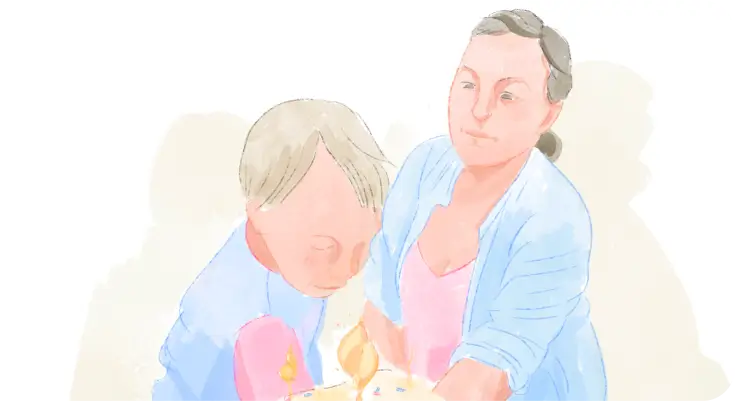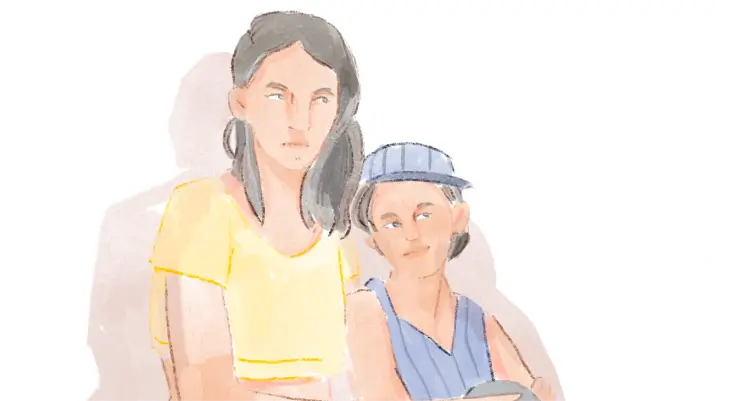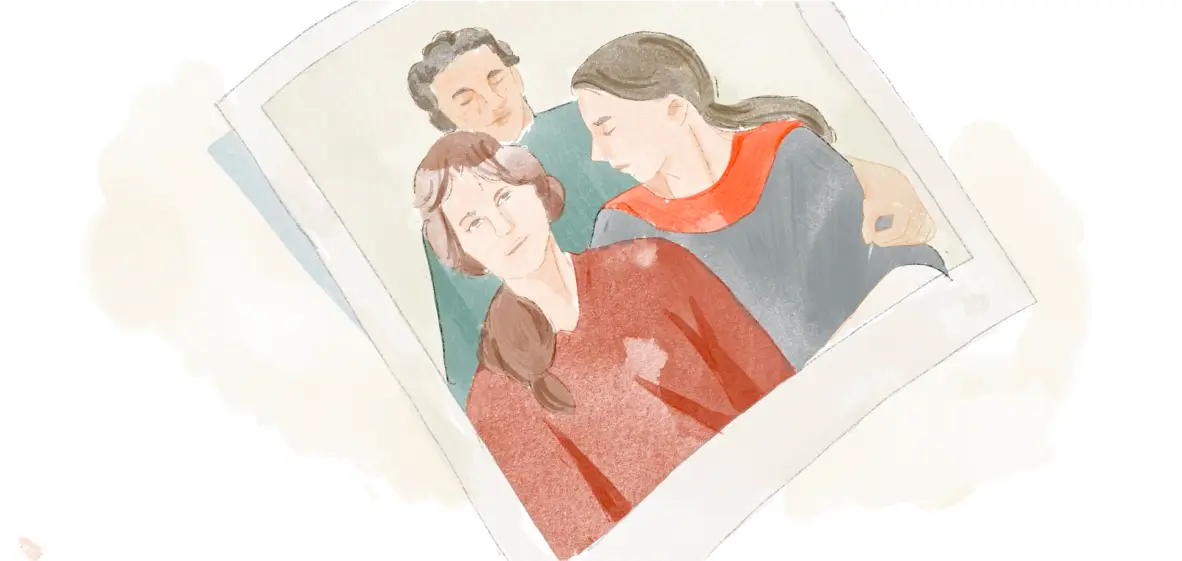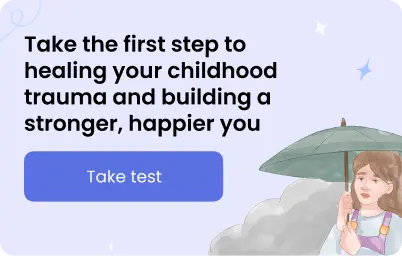We often carry our parents’ legacy within us, for better or for worse. But what happens when that legacy is less like a cherished gift and more like a nagging emptiness?
For example, have you ever felt like something was missing—a sense that you’re not quite whole? Do you struggle with a deep-seated fear of abandonment, or perhaps trust feels like a gamble?
Your inner emptiness, your fears, your trust issues…these are often born from childhood experiences – the mother and the father wound.
This article will help you learn the roots of these wounds, see their impact on your life, and find the path to a healthier future.
The mother wound vs. the father wound
In today’s thinking, we recognize that these wounds aren’t tied to a specific parent’s gender. Anyone can experience a mother or father wound from caregivers, regardless of gender.
The term “mother wound” isn’t a formal medical diagnosis. It originally came from Bethany Webster’s book Discovering the Inner Mother: A Guide to Healing the Mother Wound.
The idea of a “father wound” has been around for a while, especially in the self-help book genre and popular psychology conversations.
Books like Sons of the Father: Healing the Father-Wound in Men Today by Gordon and Healing for the Father Wound: A Trusted Christian Counselor Offers Time-Tested Advice by H. Norman Wright attempt to shed light on this topic.
In fact, we all have these “masculine” and “feminine” sides—the doer and the nurturer. When there’s a gap in how those sides of us are supported when we’re little, it might affect us.
The tricky thing is, it’s not always about actual moms and dads. It’s about whoever was in your caregiver role. They could’ve been the best in the world, but maybe they were stretched thin or didn’t know how to give you exactly what you needed.
So when we talk about the mother wound and the father wound, we’re really referring to emotional and psychological scars from childhood trauma, often caused by an unavailable or unattuned parent/caregiver.
- In short, mother wound: a lack of nurturing, love, and emotional connection.
- Father wound is a lack of guidance, protection, and a sense of safety.
Imagine feeling like there’s this hole in your heart, like you didn’t get the kind of love, hugs, and sweet words you craved. That’s what the mother wound is sometimes like. It’s tough when you don’t feel truly seen and loved by the person you’re supposed to rely on most.
Then there’s the father wound. That one’s more like… not having someone to look up to, someone who makes you feel safe, who teaches you how to stand up for yourself. It leaves you feeling lost, unsure of who to ask for help or how to set limits with people.
These wounds can leave deep marks on our sense of self, relationships, security, and self-worth. They can play into our deepest fears and insecurities.
Now, for a better understanding, let’s talk about each one separately.
What is a mother wound?
The author defines it as “A set of internalized limiting beliefs and patterns that originates from early dynamics with our mothers that causes problems in many areas of our adult lives, impacting how we see ourselves, one another, and our potential.”
In simple words, the mother wound is a form of attachment trauma, the hurt that comes from not getting the love and support every child needs. This leaves a person feeling unloved like they’re not important, and maybe even afraid that people will leave them.
Attachment theory suggests that a mother-child bond forms very early. Even before a baby is born, they start to feel safe and secure with their mom. When that bond is missing or unreliable, it can be one of the causes of the mother wound.
Early relationships with caregivers (possibly including people with father wound) are complex and can lead to an insecure attachment style, such as an avoidant, dismissive, or anxious attachment style.
We often struggle to honestly examine our relationships with our mothers. This leaves our true feelings unspoken and makes it harder to understand our own experiences.
The mother wound can grow with guilt and shame, and sometimes, it’s easy to believe we must be the ones at fault.
Reasons for the mother wound
Everyone’s experience is unique. The reasons behind the mother wound can be complex and multifaceted. If you find anything concerning within yourself, reaching out to a therapist or qualified mental health professional is always recommended for personalized support and guidance.
So, the mother wound can stem from various situations, including:
- Emotional neglect occurs when the mother is physically present but unable to connect with her child’s emotions, leaving them feeling unseen and unsupported. That can also be a sign of a lost inner child and feeling like a black sheep of the family.
You might express sadness about a friendship ending, and the mother might respond with, “Don’t be silly; you’ll make new friends” instead of comforting you.
- Abuse like emotional, physical, or verbal causes serious harm, deeply impacting a child’s sense of safety, trust, and worthiness of love.
For instance, a mother frequently criticizes a child’s appearance or uses belittling language, destroying the kid’s self-esteem and causing a mother wound.
- Abandonment trauma happens when the mom is physically absent or emotionally withdrawn, leaving the child feeling alone and unloved.
That could be a situation where the mother leaves the family due to divorce or other circumstances or battles with addiction or mental illness that keeps her emotionally distant, potentially leading to a cold mother syndrome.
- Enmeshment trauma can be another reason for the mother wound. The mom’s needs come first. She may manipulate the child for emotional support or be overly controlling (overbearing mom), hindering the child’s development of independence.
A mother uses guilt to control her child by saying things like, “After all I’ve done for you, you’re going to leave me alone?”
- Mothers with unhealed wounds struggling with their unresolved trauma may unknowingly pass on the pain to their children.
As an example, a mom who was never taught healthy coping skills frequently has angry outbursts, leaving the child feeling anxious and unsure.
- Societal Expectations can also cause the mother wound. Pressure to achieve or constantly seek approval creates an environment where love feels conditional, making it hard to feel secure within oneself.
For instance, a mother’s love seems dependent on perfect grades or winning competitions, which may leave you with “I feel like a failure” thoughts and fear of not being good enough.

The mother wound in the daughters
Your mom is your first teacher about what it means to be a female. You watch how she acts, treats herself, and handles the world.
This is a powerful thing, and if that early relationship isn’t full of love and support, it might leave a mother wound in their daughters. That may shape how you see yourself and expect relationships to work, even without you fully realizing it.
Moreover, society throws a lot at females, telling them to be caregivers and put everyone else first.
If your mother was already struggling with her emotional baggage, it’s very easy for daughters to pick up the slack, and start neglecting their own needs in the process.
So, how to understand if you might have a mother wound?
Symptoms of the mother wound in daughters
“The mother wound is the inheritance of every woman, passed down through generations of mothers who did not receive the love they longed for.” – Bethany Webster.
This may look different for everyone, but here are some common ways the mother wound shows up in daughters:
- Trouble with other females: Maybe you feel like you can’t trust other females, always a little on edge and waiting for the other shoe to drop. You might struggle to have close girlfriends, assuming they will ultimately get jealous, gossipy, or competitive.
- That mean voice in your head: When you face a challenge, you might hear echoes of your mother’s criticisms, like “You’re never going to succeed” or “You’re such a disappointment.”
- Putting your partner first, always: Females with a mother wound may become people-pleasers, losing themselves in relationships and being scared that their partners will leave if they don’t bend over backward. Also, people-pleasing can be one of the core signs of the fawn trauma response and one of the symptoms of daughters of narcissistic mothers or daughters of narcissistic fathers.
- Afraid to let people in: Being emotionally close to someone might feel risky like you’re setting yourself up to get hurt. For example, you can avoid deep intimacy, be emotionally unavailable, even in healthy relationships, by always keeping an emotional distance for fear of being rejected or hurt.
- Can’t identify yourself: Figuring out what it means to be a female on your own terms, separate from your mom, can feel really confusing and scary.
- Old patterns on repeat: This is another sign of the mother wound. You find yourself taking care of everyone around you, just like you learned to do as a kid. A female might become the “fixer” (might be a sign of parentification trauma) in their friend group and family, always providing support and neglecting her own needs.
The mother wound in the sons
Generally, mothers play a huge role in shaping sons’ understanding of females. How they treat him, what emotions they show (or don’t), and even how they relate to other males lay the groundwork for how sons will approach relationships later in life.
Society often tells boys to “grow up” and stuff their emotions down. If a mom’s not emotionally available, it reinforces this notion that feelings are weak or shameful, making it hard for him to connect fully with others as an adult.
Also, sons might get unhealthy patterns from their mothers, like picking partners who recreate the same dynamic or becoming emotionally distant themselves.
Now let’s take a look at the most common signs of mother wound in men.
Symptoms of the mother wound in sons
When I was a child my mother said to me, “If you become a soldier, you’ll be a general. If you become a monk, you’ll be the pope.” Instead, I became a painter and wound up as Picasso.”― Pablo Picasso
Here are some common ways the mother wound might appear in sons:
- Trouble with intimacy: Getting emotionally close feels scary or like a loss of control. You might pull away when things get serious.
- Seeking approval from your partner: You may constantly need reassurance, especially from romantic partners, due to a deep-seated fear that you are not good enough.
- The “Nice guy”: When you experience a mother wound, you might put everyone else first, secretly hoping it’ll earn you love, but it happens vice versa.
- Emotional outburst: Suppressed emotions, such as anger, can come out sideways, especially if you have learned that showing vulnerability is unsafe. That can be a sign of repressed trauma, too.
- Trouble with authority figures: That might often indicate a mother wound in sons. You may struggle with bosses or anyone in a position of power, especially if your mom is controlling or critical.
- Idealizing partners: This symptom of a mother wound can make you put your partner on a pedestal and then be disappointed when they turn out to be human, just like everyone else.
How to heal the mother wound in daughters and sons
“My mother would take the Band-Aid off, clean the wound, and say, “Things that are covered don’t heal well.” Mother was right. Things that are covered do not heal well.” ― T.D. Jakes, Healing the Wounds of the Past
T.D. Jakes is right. In order to start healing, we need to identify what’s bothering us. Seek a professional if you feel there is a need. They will help you identify your condition and guide you through the treatment process.
Here are some tips to start your healing journey:
✅First things first, you need to feel your emotions. Don’t avoid sadness, anger, or disappointment. Journal, talk to a trusted person, or consider therapy to process them.
✅Challenge negative self-talk and treat yourself with kindness. Do things that make you feel good (e.g., self-love quotes, reading, listening to music, watching your favorite movie, doing meditation).
✅It’s also essential to give yourself the support, validation, and love you may have missed out on. This can heal your inner child by tending to the needs that weren’t met in childhood.
✅Try to observe yourself and notice how your mother wound affects your choices and relationships. Work to change these patterns consciously.
✅Forgiveness is good. This isn’t about condoning behavior but rather about freeing yourself from resentment. You are doing it for yourself, not for someone else. It takes time and work, but it is worth it.
✅Therapy can be beneficial. Consider support groups or reading books about childhood trauma.

What is a father wound?
Fathers offer a unique kind of influence. They often represent strength, safety, guidance, and how to navigate the world. If that’s missing or distorted, it can make us feel lost in life.
Studies show a lack of a father figure in childhood can harm kids’ social and emotional growth, often leading to aggression or attention-grabbing behavior.
The father wound can happen with physically present dads, too. Such things as emotional absence, criticism, or an inability to provide support also create wounds.
In fact, around 25% of children in the U.S. live in households without a father.
While the dynamics are different, everyone experiences a version of the father wound.
The father wound in daughters
A father is a daughter’s first experience with an example of strong energy. They play a significant role in shaping a daughter’s perception of future partners.
If a father is absent, emotionally unavailable, or abusive, a daughter may develop a distorted view of what love and support from a partner should look like, which may lead to trauma bonding with her partner in the future.
Daughters often subconsciously look to their fathers for a sense of safety and protection. When that’s missing, it can create deep-rooted feelings of insecurity and vulnerability in the world.
Symptoms of father wound in daughters
The signs of a father wound can be subtle and easily mistaken for other childhood challenges. Because of this, they often go unnoticed, leaving the wound to grow.
However, if you find yourself relating to the following experiences, it may be a sign you’ve experienced a father wound.
So, here are the most common signs of father wound in daughters:
- Attraction to unavailable males: You may subconsciously seek partners who echo your father’s emotional distance, recreating painful patterns to gain unreceived love. Have you found yourself repeatedly falling for those who seem emotionally closed off or incapable of commitment? Yes, this is it.
- Fear of abandonment: Deep down, you may expect males to leave, leading to clingy behavior, distrust, or self-sabotaging relationships. You may be intensely jealous or anxious when a partner doesn’t immediately respond to texts, and you may start thinking, “No one cares about me.”
- People-pleasing: You chase approval and endlessly give in relationships, secretly hoping it will finally make you feel worthy. Saying “yes” to plans with mates becomes constant even when you’re exhausted and rarely express your actual needs.
- Blur personal boundaries: You may experience a father wound if saying no or prioritizing your needs is impossible because you feel you don’t deserve care. You let a partner constantly criticize you without defending yourself, or you struggle to ask for help even when overwhelmed.
- Unable to identify yourself: Daughters with father wounds often struggle to define who they really are. They might feel like they need someone to feel complete or constantly change themselves to try to please their partners.
For example, you can dress or adopt hobbies based on what you think a specific male will like rather than what feels true to you.
- Masculine energy issues: You could be uncomfortable with your own power and ambition or, conversely, become overly assertive and reject traditionally feminine qualities. You may feel intimidated by successful women or believe you have to act “tough” to be taken seriously.
The father wound in sons
Dads play a crucial role in their sons’ lives, too. They model masculine characteristics, can teach some life skills, and (ideally) offer support and guidance. When that father-son connection is missing, emotionally distant, or even harmful, it may create the father wound.
The concept of the “father wound” may not be an official term as well, but it points to the potential impact of childhood experiences on our emotional lives.
Sons learn what it means to be a male by watching their fathers. If that blueprint is shaky, it creates uncertainty regarding how to act, make decisions, and navigate the world.
Also, fathers help sons learn how to name and handle emotions, express them healthily, and regulate complicated feelings like anger or frustration. Without this guidance, sons can struggle with emotional turmoil.
A present, loving father provides a feeling of security. Their absence can lead to a deep-seated fear that the world is unsafe or that you must go it alone.
Symptoms of the father wound in sons
The father wound can play out in various ways:
- Performance pressure: You may constantly need to prove yourself, driven by a hidden fear of not being good enough. Like working long hours and obsessively checking for mistakes, or you can take on too much responsibility at work.
- Imposter syndrome: This is a heavy feeling that you are a fraud and will eventually be found out. For example, despite receiving a promotion, you can be convinced it was a mistake, and you’ll soon be found inadequate.
- Authority triggers: Like the mother wound, struggling with powerful males can arise from a troubled relationship with your father. You might become passive-aggressive with anyone in a position of power, subtly undermining their directives.
- Fear of failure: Sons with father wounds might be paralyzed by the fear of making a misstep, so they might avoid taking risks or going after their goals. For instance, you never apply for that dream job. You’re convinced you won’t get it because you’re not qualified enough.
- Self-sabotage: It’s unconsciously rejecting opportunities for success because you believe you don’t deserve good things. For example, you may turn down a promising relationship opportunity, believing deep down that you don’t deserve happiness.
- Feeling vulnerable: A father wound can make you bottle up emotions and refuse to ask for help because you may see this as a sign of weakness. You may suffer from anxiety or depression but refuse to seek therapy, convinced you should be able to handle everything on your own.
How to heal the father wound in sons and daughters
Healing the father wound isn’t about blaming your dad. Often, fathers are doing the best they can with the resources they have. It’s about understanding the wound’s impact and creating new, healthier patterns. Consider the following tips:
✅Don’t deny the pain your father’s actions or absence have caused. Instead of saying, “It wasn’t that bad,” allow yourself to write in a journal about how his criticism made you feel less significant.
✅Treat yourself with kindness. You weren’t to blame. For example, when a negative thought about yourself pops up, gently replace it with something positive (“I’m doing my best” or “Everything is fine”).
✅Give yourself the love. Tell yourself, “I’m proud of how hard I worked on this.”
✅Build healthy relationships with people who support and value you. Choose friends who uplift you and make you feel safe.
Remember, a good therapist can be invaluable in helping you work through complex emotions and develop healthy coping mechanisms.
Disclaimer
This article is for general informative and self-discovery purposes only. It should not replace expert guidance from professionals.
Any action you take in response to the information in this article, whether directly or indirectly, is solely your responsibility and is done at your own risk. Breeze content team and its mental health experts disclaim any liability, loss, or risk, personal, professional, or otherwise, which may result from the use and/or application of any content.
Always consult your doctor or other certified health practitioner with any medical questions or concerns
Breeze articles exclusively cite trusted sources, such as academic research institutions and medical associations, including research and studies from PubMed, ResearchGate, or similar databases. Examine our subject-matter editors and editorial process to see how we verify facts and maintain the accuracy, reliability, and trustworthiness of our material.
Was this article helpful?




